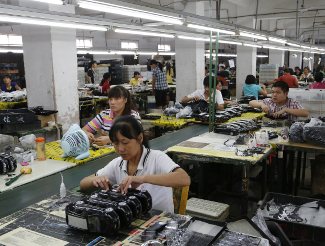China’s economy has grown by leaps and bounds over the past couple of decades, with many economists speculating that it could overtake the US economy as the world’s largest within 15 years. But that facade of enormous growth is hiding some real structural problems that could seriously weaken the Chinese economy in the near future. Here are three of the most pressing problems.
1. Mountains of Debt
China is one of the most indebted countries in the world, both in terms of overall figures and in terms of debt to GDP ratio. With an estimated $34 trillion of total public and private debt, plus an additional $10 trillion of debt outstanding through the shadow banking system, China is awash in debt. Its banking system isn’t nearly as mature or robust as most Western countries, and the country also has a large number of state-owned enterprises that have relied on debt for much of their growth. That debt bubble is threatened both by its sheer size and rising interest rates, and when it pops it could take the Chinese economy down.
2. Slowing of Trade
China’s trade figures for December not only decreased, they were way off the estimates put forth by economists. Exports fell 4.4% year-on-year versus the 2.0% increase that was expected, and imports fell 7.6% year-on-year, versus the 4.5% expected. Those are huge misses and a sign that the trade conflict with the US is finally starting to bite. Now that China is the most important world economy for international trade, a continued trade slowdown will not only harm China’s economy but also those of its trading partners.
3. Government Intervention Keeping Things Alive
The only thing keeping the Chinese economy propped up right now is massive amounts of government intervention. Last week the Chinese government injected a record amount of liquidity into the banking system to shore things up, a sign that things are looking less than rosy. That follows rate cuts that were intended to boost loans, so the government is pulling out all the stops to keep the economy from slowing. But it might be too little, too late.
If China’s economy enters a recession it could pull countries around the world down with it. We’ve been expecting the Chinese economic bubble to pop for years, but a bursting bubble will have not just economic but also geopolitical considerations. The Chinese government may attempt to deflect public attention away from economic malaise by becoming more bellicose in its foreign policy, which could exacerbate tensions with the US.
Both economic and political turmoil will drive up demand for gold as investors both in China and in the US look for a safe haven to protect their assets. Gold has served as a safe haven for centuries, protecting investors from inflation, stock market crashes, and collapsing economies. Investors in the US have the benefit of being able to invest in gold IRAs, which offer the same tax advantages of traditional retirement accounts while still allowing investors to invest in gold. With gold already set to soar this year, now’s the time to get into gold to protect your assets from the coming economic cataclysm.
This article was originally posted on Goldco.




